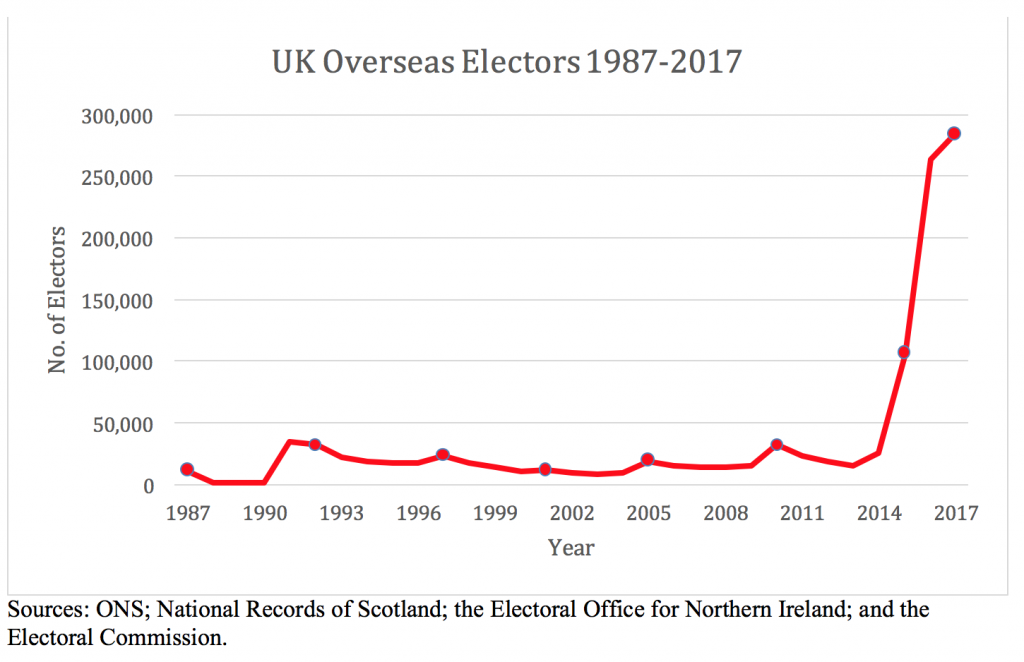 Will the Overseas Electors Bill, proposing to give Britons living abroad the right to vote in UK elections for life, make it beyond second reading? Sue Collard puts recent developments in their wider context and explains their potential implications. She argues that if government does indeed mean business, then the issue is far too important to those affected to justify it being eventually sacrificed to party politics.
Will the Overseas Electors Bill, proposing to give Britons living abroad the right to vote in UK elections for life, make it beyond second reading? Sue Collard puts recent developments in their wider context and explains their potential implications. She argues that if government does indeed mean business, then the issue is far too important to those affected to justify it being eventually sacrificed to party politics.
An announcement from the Cabinet Office on 8 February confirmed that the government is still committed to implementing a pledge made in the 2014 Conservative Manifesto and endorsed by David Cameron in 2015, to grant ‘Votes For Life’ (VFL) to UK citizens resident abroad. This means abolishing the current rule that disenfranchises UK citizens who have been resident abroad for more than 15 years.
Cameron’s promise was originally made in response to long-standing demands by expat campaigners, whose public figurehead is the indomitable war veteran, Harry Shindler MBE. But he and other activists were deeply aggrieved by the government’s failure to implement VFL before the EU referendum, despite their legal challenge. Verbal commitments under Theresa May to honour Cameron’s pledge before the next scheduled election have done little to reassure them, and it has been widely assumed that this bill was being kicked into the long grass.
That is, until the recent statement, which went further than the simple reiteration of a tired promise. This time it was backed up by the publication of detailed responses to the policy proposals announced in October 2016. This latest document shows that the Cabinet Office has indeed been hard at work, trying to thrash out the complex implications of extending the franchise to what it estimates to be potentially 3 million ‘overseas electors’.
Registration issues
The current system of electoral registration allows ‘expatriate’ citizens to continue to vote for 15 years (by postal vote or by proxy), in the constituency where they were last registered. Until 2015, registration levels for overseas electors were in fact extremely low, largely due to bureaucratic obstacles. But the introduction of online registration in 2014 triggered a massive increase in registration, which was further magnified by the 2016 EU referendum and 2017 snap election, when the number rose to over 285,000.
This increase has caused headaches for the electoral authorities, trying to administer an already overloaded and underfunded electoral system. But the introduction of VFL would add to their burden because it means developing a whole new registration process to cater for those whose registration lapsed more than 15 years ago: their previous addresses cannot be verified through the electoral registers because the law does not require electoral authorities to keep these for more than 15 years. The Cabinet Office proposes therefore to allow registration based on proof of previous residence; but this throws up additional complications that have been highlighted by the Association of Electoral Administrators in its response to the consultation.
Certain campaigners have suggested that the creation of dedicated ‘overseas’ constituencies, such as those created by France, Italy, and Portugal, would avoid the problems of establishing proof of previous registration or residence, and would give expats better representation. However, this idea has been rejected by the Cabinet Office on the grounds that it constitutes ‘too fundamental a departure from the existing arrangements’. Besides, it is a proposal that does not sit well with the government’s plan to reduce the number of constituencies.
Does the government really mean business?
Just how significant is the government’s recent announcement? The failure to include VFL in the latest Queen’s Speech suggested that, given the Brexit agenda, parliamentary time would not be found for this bill. Yet February’s press release explicitly makes reference to the imminent second reading debate in the House of Commons of a Private Member’s Bill on Overseas Electors, to be presented on 23rd February by Glyn Davies MP. The implication, now confirmed, is that the government will be supporting this bill.
This is further corroborated by the simultaneous statement from the Chair of ‘Conservatives Abroad’, Heather Harper, who welcomed the government’s renewed commitment to VFL: “The second reading of [the Overseas Electors Bill] brings us closer to getting votes for life for all British expatriates”. Conservatives Abroad have played a key role in getting VFL put on the government’s policy agenda. They have been campaigning on this issue for many years within the party, but it was the advent of coalition politics in 2010 which enabled them to highlight the potential contribution of overseas supporters towards winning selected target seats in marginal constituencies. Their efforts in the 2015 election campaign were rewarded by Cameron’s inclusion of VFL in the Queen’s Speech.
So it looks as if now the government really might mean business on VFL, but this time, spurred on by a different political context: the post-Brexit. The message from Chloe Smith, Minister for the Constitution, makes an explicit link to a brave new vision of the post-Brexit world and the role that expats are expected to play in it:
Following the British people’s decision to leave the EU, we need to strengthen ties with countries around the world and show the UK is an outward-facing nation. Our expat community has an important role to play in helping Britain expand international trade, especially given two-thirds of expats live outside the EU.
Assuming the VFL bill makes it beyond the second reading, we can expect any subsequent parliamentary debate to be highly politicised: opposition parties see VFL not as a progressive move to end the disenfranchisement of potentially millions of its citizens living outside the UK, but as a cynical ploy to increase Tory votes and donations (individuals can only donate if they are on an electoral register). It remains to be seen whether partisan positions based on mere assumptions about the political preferences of expats will continue to hold sway, or whether more substantiated arguments might be brought to bear on the discussions. This issue is far too important to those directly affected to justify its being sacrificed to party politics.
_______
 Sue Collard is Senior Lecturer in the Department of Politics at the University of Sussex.
Sue Collard is Senior Lecturer in the Department of Politics at the University of Sussex.









Well on the debate itself it seems Labour is apposed to giving ex pats the4 right to vote.
I am very angry about this attitute.
Offically there is no labour Policy and ive tried to ask them about it only every time to have my question dodged.
this will backfire why should i even vote for Labour when they actively try to keep the ex pat ban in place.
Even to make it worse champion the 100th anniversary of the suffragette movement yet still denying millions of ex pats their right to vote.
then to say a Britain for many not a few ist in my opinion simply hypocrisy and a joke to all ex pats .
id like to hear what they´d say to harry shindler as a Labour memeber why hes still not allowed a vote. would be an intresting conversation
James,
I can assure you that Harry has had that conversation many times with various members of his party! Labour International has been bravely battling for Votes For Life but struggling to convince the leadership. If you followed the debate on the Second Reading last week you will have seen Cat Smith invoking arguments about electoral administration rather than political point scoring or any principled opposition, so this suggests to me there is at least some movement going on there …. Mike Gapes also spoke out in support of the bill so this was probably as much as could be expected.
Your best bet is to target such sympathetic Labour MPs with letters and emails and hope that they can persuade their leaders to take a look at some of the latest research that should give them food for thought.
Sue
Frankly, after Sandy Martin’ performance, Labour went down through the floor in my opinion…
BS comments like ‘no representation without taxation’ and ‘should vote in the country where they live’ showed total insensitivity to the genuine contact expats have with the UK and the continuing effect HMGov has on their lives, while ignoring the reality that immigrants can’t vote (that’s a right citizens get, unless they’re long-term British expats)… and harking back to the days when only landowners had the vote!
In comparison, Glyn Davies showed a simple humanity and understanding that was most impressive.
Yes Sandy Martin gave a dismal performance, but I was assuming that Cat Smith’s approach was closer to leadership thinking on this issue. The flaws in his comments were easily laid bare in the debate: I’m just surprised he was allowed to drivel on for so long.
Having to prove previous registration or previous residence seems quite superfluous and bureaucratic. The criterion should be to prove nationality by having a UK passport. Then it should be a simple case of taking people’s word for where they used to live and registering them accordingly. Some will get it wrong, I have met those who can’t remember where they were last registered, and some may not be truthful, but the majority will be and at the end of the day it doesn’t matter. The important thing is being able to vote somewhere.
Rhodri,
I see why you might think this, but there are two issues here that you have overlooked: the first is that a number of Britons living abroad who have dual or multiple citizenships have not kept up their UK passport even though they are still eligible for one. This can be for a combination of reasons, bureaucratic, financial or personal. It would, I think, be reasonable to make having a passport a pre-condition of registration to vote, but it should not be assumed that all British citizens resident outside the UK currently hold UK passports. It might be worth bearing this in mind when estimations of the number of Britons currently living abroad are made, based on the number of UK passport holders.
The second issue is more political: allowing people to vote where they choose (which would pretty much be the result of your suggestion), would immediately fuel claims that they are trying to vote where it would be most beneficial to their preferred party. If you read earlier debates in parliament on the question of granting votes to overseas electors you will see that this point was raised by opponents of the legislation, backed up by specific accusations of what happened for example in the Vale of Glamorgan in the 1992 election: Conservative Party activists were said to have acted as proxies for enough overseas voters in South Africa to have brought about the defeat of the outgoing MP John Smith by 19 votes (there were 65 overseas voters).
Although the current debate is no longer as overtly politicised, partisan motivations still underpin much of the opposition’s views. So although as a voter it may seem to you that the most important thing is being able to vote somewhere, I’m afraid it is simply not the case objectively: the choice of where you vote CAN matter in terms of electoral outcome. Fears of gerrymandering could easily undermine this bill so the Cabinet Office is in my view right in covering its back on this one.
It seems to me that if you do not maintain your UK passport – it indicates truly a lack of interest in the ‘home country’ I assumed that Rhodri’s comment ‘It is important to have the vote somewhere’ implies for the Westminster Parliament.. Personally I do not favour proxy voting. It indeed leaves a gerrymander loophole. Suely we should have overseas constituencies and a form of electronic voting and (for those without use of the internet -There are some!!) postal voting, even personal voting, to consulates. At this stage in the evolution of the overseas plebiscite I suggest Passport number plus declared interest for a certain constituency – even if one cannot present positive proof of having lived there.
Brits with dual nationality and without a current valid UK passport are pretty certainly living in the country with which they have citizenship (I certainly will, if ever my request is approved!). So they do have the right to vote…
I’d suggest you shouldn’t expect right to vote in two countries. Let’s concentrate on having a voice!
Well there are many people with dual or multiple citizenships who do have the right to vote in those countries eg someone with dual French / Italian citizenship, and many of them vote in both (though some don’t vote at all). This follows from the close association of citizenship with unrestricted voting rights in those countries. There are other people who have no national voting rights eg all Irish citizens living outside Ireland, or UK citizens who left the UK more than 15 years ago. For some people, having a vote anywhere/somewhere may be sufficient, but for others, the place where they vote is important. If you are for example a UK pensioner living in France or Spain for over 15 years, you may think it is more important to vote in the UK than in your country of residence because your pension and other rights (especially in the context of Brexit) are determined by the UK government. You would be ‘affected’ by policies made in both countries, possibly even pay tax in both, and therefore might claim a right to vote in both. There are also issues of identity that condition people’s views about voting. No doubt all these different aspects will be debated in the forthcoming debates on the Overseas Electors Bill as it progresses on from the Second Reading.
ANY vote would be good.
As an overseas British voter still eligible to vote as I have done for as long as I have been able – I feel it is
ridiculous and discriminatory to retain a law that is circumventable by the rich and not by anyone else. Because it is predicated on geography, not citizenship, age, sex, political leaning, tax etc – just a postcode… Wealthy ex-pats can leave their homes abroad after 14 years, re-establish UK residency in six months then return abroad for another 15 years! Most ex-pats don’t have the income to afford that. So the fact that the law is so discriminatory should be enough, on its own, to abolish it. It harks back to the days when voters had to own property and therefore have a certain income to be allowed to vote – only this law even dictates where that property is held! My mother has retained her interest in the UK for the forty years since she left. My father, after a thirty years of military and public service, worked abroad, commissioning British Companies to fill contracts in the Far and Middle East. Their grandchildren live in the UK. Now widowed, my mother continues to pay UK tax, but, despite supporting the UK all her life and carrying a British passport – she has no voice – she has been disenfranchised by no crime other than her address. This is an apolitical issue. Labour International is extremely active in this region of Spain, for example, they raise considerable awareness of UK issues. It is a misconception to assume that all ex-pats are right-wing. My 15 years of being able to continue to vote to support the excellent work my MP does in my home constituency will soon end… I may get one more National Election in – but, unless MPs speak up, I and many others like me will soon be silenced. This is happening all over the UK for every political party as overseas voters fade away, unheard… Many of us are still paying tax in the UK and continue to contribute to the system – but with no representation. As has been said – This just at a time when the UK needs every overseas citizen to support the UK finding trade links and political allies post-brexit… Surely it is time to embrace us and the goodwill we bring from the countries where we are now based?
Given the government’s total disregard for expats over the last two general elections and a referendum that is bringing untold upheaval and heartbreak to thousands of disenfranchised citizens, I would say that any party political gain the Tories hope to get from VFL would be more than compensated for by the hate (word chosen with care) they have created.
Giving votes to expats is necessary – it’s hard to believe that the ‘mother of all parliaments’ is less representative than the USA, France, Portugal or Italy.
A well constructed article. It is true that many British Citizens abroad are brought to anger by the current situation. Thousands were not permitted to vote in the last referendum and election, though their lives will be profoundly affected by the results. The momory of recent years sticks in one’s mind. The Conservative neglect of Britons Abroad , but also Blairs removal of my Right to Vote. So many Britons are taking out the nationalityof their State of Residence.
The assumption that most Britons abroad (I avoid the word ‘expats’ deliberately) would vote Conservative is unwarranted. Harry Shindler is a life-time supporter of Labour. I myself would vote Liberal-Democrat on their current policiies. Passing the Bill now on the stocks, might encourage the Conservative vote . Buit Labour must not pass this opportunity by.. If they oppose it (but it passes) THE LABOUR Party will most certainly lose out. IF they support it, the consequence could be most interesting. I believe it is in the greatest interest of the Labour Party to wholeheartedly support this Bill. This is an opportunity for real change in the politics of Britain… It must not be allowed to slip away.
I agree with much of what Sue Collard has written on VFL. However, I think she overlooks the fact that the failure by this Government to fulfil the promises made on Citizens’ Rights are beginning to have an effect on the attitudes amongst UK Citizens working and living in Europe. ONS statistics, when combined with DWP stats really do show that 80% of UK Citizens working and living in the EU are of working age, or are still in full time education. They are those who will be most affected by any restrictions to free movement which could result from the intransigence of the UK Government intent on enforcing ‘Settled Status’ on EU Citizens working and living in the UK. So, I do not think that the Conservative Party can any longer consider VFL to be in their favour, instead the Labour Party should be looking rather more closely at what is happening on the ground.
Thankyou for your comment Roger, and apologies for my slow reply. I think you have misread my piece: I said that the issue of VFL was underpinned by assumptions of political preferences, but I certainly don’t think they are well founded. On the contrary, my research has been trying to produce some evidence to show that it is at the very least outdated to present ‘ex-pats’ as Tory supporters, even if there was probably some truth in this back in the 1980s.
You are right to point out that Brexit has alienated many former Conservative supporters, and my survey results from last Summer clearly show this (results still undergoing analysis). It may even be that the ‘overseas’ vote contributed to the disastrous result for Theresa May last June. It may also just be the case that the Labour Party is finally waking up to this: last Friday’s debate on the Second Reading was devoid of the poisonous political comments from Labour that have characterised earlier debates on voting rights for overseas electors, even if there was still plenty of evidence of an instinctive rejection of the idea of granting VFL to those who have chosen to live outside the UK.
But if I did not mention in the blog the issue regarding EU citizenship rights, it was in order to keep this separate from the issue of VFL, even though there are obviously linkages. Although a large proportion of the overseas electors registered in 2016 & 2017 probably live in the EU, I think it is significant that Chloe Smith pointed out that ‘two thirds of expats live outside the EU’ (Cabinet Office data presumably). Likewise, in his ‘Valentine’ speech, Boris Johnson, reproduced in The Spectator, commented that “There are more British people living in Australia than in the whole of the EU, and more in the US and Canada.” So it could be that the government is looking beyond the EU towards more distant horizons for its future votes from overseas in the post-Brexit return to global Britain!